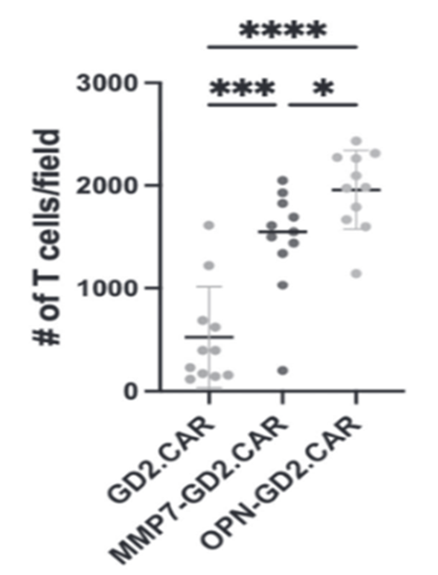CAR-T cell therapy has emerged as a promising cancer treatment, leveraging patient’s own T cells that are genetically modifying to express a Chimeric Antigen Receptor (CAR). These receptors enable T cells to recognize and attack antigens on the surface of cancerous cells more effectively. While highly effective against certain cancers, solid tumors often resist this therapy due to the dense extracellular matrices (ECMs) and basement membranes (BMs) that shields them from immune cell infiltration.
To overcome this barrier, researchers at GW in collaboration with scientist at Baylor College of medicine have developed an innovative technology that enhances immune cell functionality. By engineering T cells, NK cells, and B cells, to express Matrix Metalloproteinases (MMPs) and Osteopontins (OPNs), this approach significantly improves immune cell infiltration into solid tumors as shown in Figure 1. MMPs are specialized enzymes that break down ECM fibers, while OPNs help cells migrate by anchoring the cytoskeleton. This dual action enhances the immune cell penetration in the tumor microenvironment.
This technology offers a tailored solution, as specific MMPs can be selected to target unique ECM profile of each tumor. Furthermore, these engineered immune cells can simultaneously express therapeutic genes, such as CARs and T Cell Receptors (TCRs), to target tumor-specific antigens. Compared to existing ECM-modulating technologies, this approach uniquely integrates enhanced migration and antigen-specific targeting for a comprehensive anti-tumor response. By combining ECM degradation with precise antigen targeting, this approach aims to elicit a more robust anti-tumor response, ultimately improving clinical outcomes for patients battling solid tumors. This novel solution holds significant potential to revolutionize cancer therapy by addressing one of the critical limitations of current CAR-T cell treatments.

Figure 1: Enhanced tumor infiltration of engineered CAR-T cells. Engineering CAR-T cells to express MMPs and OPNs significantly enhances their infiltration into solid tumors in vivo, compared to CAR-T cells without these modifications.
Advantages:
- Enhanced immune cell infiltration
- Tumor-specific tailoring based on unique ECM profiles
- Versatility across immune cell types (T cells, NK cells, B cells) for broader cancer treatment applications.
- Dual action combining ECM degradation with antigen-specific targeting for stronger anti-tumor responses
Applications:
- Expanding CAR-T therapy applications to solid tumors
- Combination therapies with immune checkpoint inhibitors or oncolytic viruses
- Personalized cancer therapy